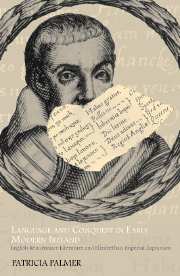 Language and Conquest in Early Modern Ireland
Language and Conquest in Early Modern Ireland Book contents
- Frontmatter
- Contents
- Acknowledgements
- List of abbreviations
- Introduction
- Chapter 1 Conquest, colonial ideologies and the consequences for language
- Chapter 2 ‘A bad dream with no sound’: the representation of Irish in the texts of the Elizabethan conquest
- Chapter 3 ‘Wilde Speech’: Elizabethan evaluations of Irish
- Chapter 4 ‘Translating this kingdom of the new’: English linguistic nationalism and Anglicisation policy in Ireland
- Chapter 5 New world, new incomprehension: patterns of change and continuity in the English encounter with native languages from Munster to Manoa
- Chapter 6 The clamorous silence
- Conclusion
- Glossary
- Notes
- Bibliography
- Index
Chapter 1 - Conquest, colonial ideologies and the consequences for language
Published online by Cambridge University Press: 22 September 2009
- Frontmatter
- Contents
- Acknowledgements
- List of abbreviations
- Introduction
- Chapter 1 Conquest, colonial ideologies and the consequences for language
- Chapter 2 ‘A bad dream with no sound’: the representation of Irish in the texts of the Elizabethan conquest
- Chapter 3 ‘Wilde Speech’: Elizabethan evaluations of Irish
- Chapter 4 ‘Translating this kingdom of the new’: English linguistic nationalism and Anglicisation policy in Ireland
- Chapter 5 New world, new incomprehension: patterns of change and continuity in the English encounter with native languages from Munster to Manoa
- Chapter 6 The clamorous silence
- Conclusion
- Glossary
- Notes
- Bibliography
- Index
Summary
Les discours sont, eux aussi, des événements.
Tzvetan Todorov, Nous et les Autres, p. 14The sixteenth century in Ireland was action-packed and dynamic. The transformations that occurred were so sweeping that the century, which opened with Gerald FitzGerald, the future ninth earl of Kildare and Lord Deputy, travelling to Court to marry Elizabeth Zouche, seems to close, on the eve of Kinsale, on a different world. In that time, Ireland had moved from being an almost forgotten ‘distant border province’ (Ellis, Tudor Ireland, p. 86), left to its own devices and those of its Old English and Gaelic magnates, to a colony in revolt at the centre of Elizabethan attention. In the interim, the country was the stage for a bewildering variety of policy changes; the cast was swelled by an influx of bureaucrats, aristocrats, adventurers, soldiers, settlers and proselytisers; and the nature of the military engagement shifted from marcher skirmishes to full-scale war with an international dimension. Caught up in all of this was language: as medium of negotiation, as subject of interdictions, as badge of identity, as index of civility, as symbol of otherness, as bearer of ideology, as words in the mouth of a preacher, as battlecry, as lines tumbling off the newly established printing presses, as – when O'Donnell, on a hosting in Sligo, slaughtered all males unable to speak Irish (O'Sullivan, Ireland under Elizabeth, p. 82) – death-warrant.
- Type
- Chapter
- Information
- Language and Conquest in Early Modern IrelandEnglish Renaissance Literature and Elizabethan Imperial Expansion, pp. 8 - 39Publisher: Cambridge University PressPrint publication year: 2001


